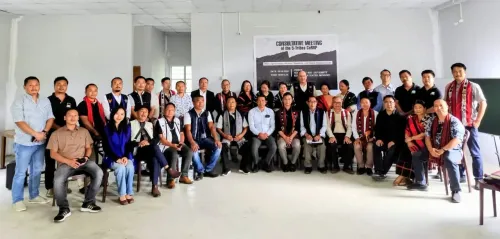What Are the Reactions to GST Reduction on Farm Inputs?

Synopsis
Key Takeaways
- GST reduction from 18% to 5% on major farm inputs.
- Positive response from Bharatiya Kisan Sangh.
- Concerns from other unions regarding the scope of the reduction.
- Full exemption on agricultural machinery poses challenges for manufacturers.
- Potential for increased food production with cheaper agricultural tools.
New Delhi, Sep 4 (NationPress) The Goods and Services Tax (GST) Council convened its 56th meeting on September 4, presided over by Union Finance Minister Nirmala Sitharaman, where it sanctioned a decrease from 18 percent to 5 percent on significant agricultural inputs including tractors, machinery, fertilizers, and irrigation equipment.
While the Bharatiya Kisan Sangh (BKS), aligned with the Rashtriya Swayamsevak Sangh (RSS), expressed approval for this decision, other groups are advocating for similar reductions on a broader range of items.
“This change is poised to revolutionize the agricultural sector and lower farming costs, directly benefiting small and marginal farmers,” remarked BKS General Secretary Mohini Mohan Mishra. He further added, “More affordable agricultural tools will enhance food grain production.”
In contrast, Raju Shetti, President of the Swabhimani Shetkari Sanghatana, questioned the impact, stating, “The GST reduction appears mainly for bio-pesticides, which are utilized by only 5 percent of farmers in India. How does this assist the majority?” He urged for similar tax cuts on chemical pesticides and insecticides, which are widely used by farmers.
Guni Prakash of the Bhartiya Kisan Union (Mann) also acknowledged the “relief” from the 5 percent GST on agricultural machinery, noting his involvement in a government committee addressing farmers' concerns.
When approached, a senior member of the Samyukta Kisan Morcha (SKM), a coalition of farmers' groups, labeled the move as “too little, too late,” indicating that they would assess the proposal further before an official response.
The Finance Ministry earlier indicated that the GST rate on agricultural machinery and equipment—including sprinklers, drip irrigation systems, and various harvesting machinery—has been reduced from 12 percent to 5 percent.
Regarding the full exemption for agricultural machinery, the ministry clarified that the aim of rate rationalization is to maintain a balance between users and producers. “While it is crucial to offer relief to farmers, we must also ensure that domestic manufacturing remains unaffected,” they stated.
They elaborated that a full exemption would prevent manufacturers from claiming input tax credit on GST paid for raw materials, subsequently increasing their effective tax burden and production costs. This could ultimately lead to higher prices for farmers, making the initiative counterproductive, as explained by the minister.









